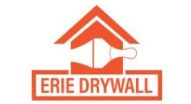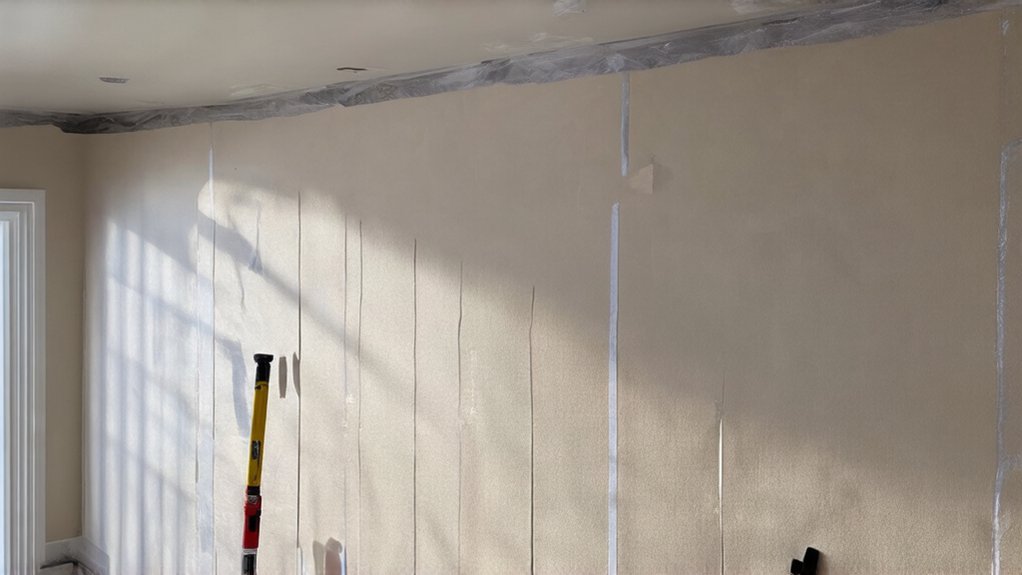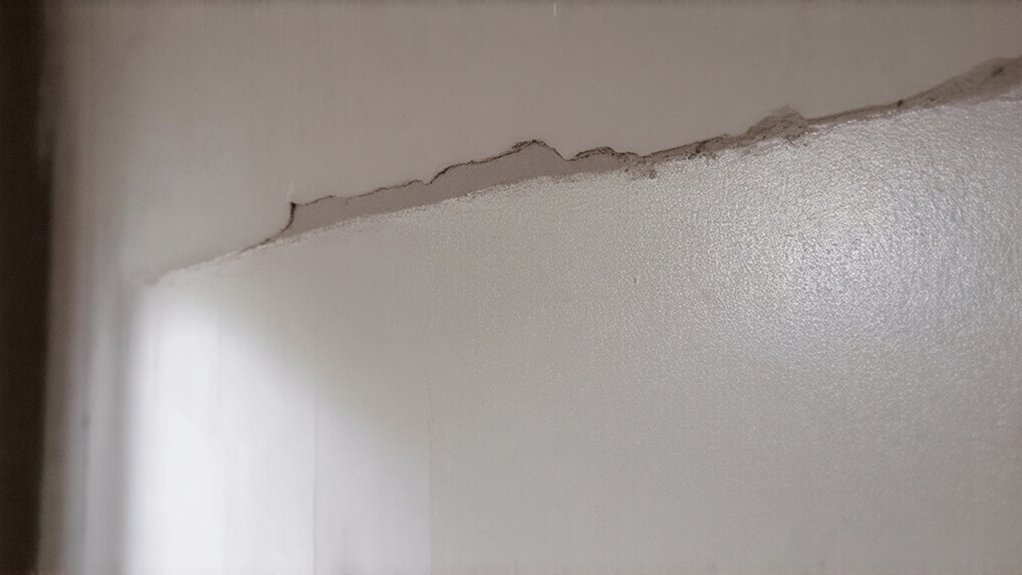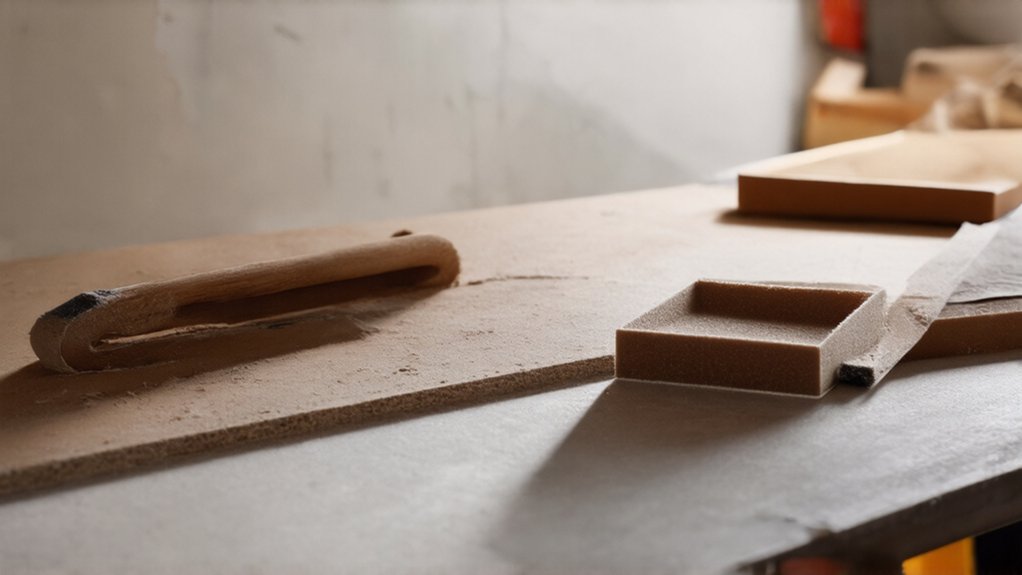When soundproofing your home, choose specialized drywall materials that block noise effectively. Install mass-loaded vinyl and acoustic compounds between layers to minimize sound transmission. Use resilient channel systems that decouple walls and interrupt sound waves. Opt for high-density insulation and consider double stud wall configurations for maximum noise reduction. These strategic techniques will uncover your living space into a quieter sanctuary—and there's more to reveal.
Understanding Sound Transmission in Residential Spaces
Sound waves are sneaky travelers, effortlessly passing through walls, floors, and ceilings in ways most homeowners never realize. Understanding acoustic properties helps you combat unwanted noise transmission in your living space. Popcorn texture drywall can provide additional acoustic benefits for homeowners seeking to reduce sound transmission between rooms. Different sound transmission factors like wall density, material composition, and structural design markedly impact how sound travels between rooms. You'll want to recognize that standard drywall often fails to block noise effectively, allowing conversations, TV sounds, and other disturbances to penetrate your personal spaces.
Selecting the Right Soundproof Drywall Materials
Three key factors determine your success in selecting soundproof drywall materials that'll dramatically reduce noise transmission in your home. First, consider drywall soundproofing properties like mass and density, which directly impact sound blocking effectiveness. Mass-loaded vinyl and soundproofing compound layers can bolster your drywall's performance, creating quieter living spaces.
Different soundproofing drywall types—like resilient channel systems and specialized acoustic panels—offer unique noise reduction capabilities. You'll want to match material characteristics with your specific noise challenges, whether it's street sounds, neighbor interactions, or internal room shifts. Your strategic material selection can alter your home's acoustic environment. Residential drywall services in Erie, PA offer professional expertise in implementing advanced soundproofing techniques for optimal noise reduction.
Essential Tools and Preparation for Noise Reduction
After selecting the right soundproofing drywall materials, you'll need proper tools and strategic preparation to safeguard maximum noise reduction in your home. You'll want to create an efficient work area layout that supports your soundproofing project.
Consider these essential steps:
- Gather proper protective equipment like safety glasses, dust masks, and work gloves
- Prepare a clean, organized workspace with adequate lighting
- Certify you have specialized soundproofing installation tools
- Check that your measuring and cutting tools are precise and sharp
Your thoughtful preparation will help confirm a successful noise reduction installation.
Advanced Drywall Installation Techniques
When you're ready to tackle soundproofing your home, becoming proficient in advanced drywall installation techniques can make a significant difference in noise reduction.
Double stud wall configurations provide an excellent method for minimizing sound transmission between rooms. By creating a gap between two separate wall frames, you'll drastically reduce acoustic vibrations.
Resilient channel installation represents another powerful technique, allowing you to decouple drywall from wall studs and minimize sound transfer. These advanced strategies require precision and careful planning, but they'll help you create a quieter, more peaceful living environment that feels truly comfortable and serene.
Acoustic Compound and Insulation Strategies
Successful soundproofing hinges on selecting the right acoustic compound and insulation materials that'll dramatically reduce noise transmission through your walls. You'll want to focus on proven sound absorption techniques that convert your living space into a quiet sanctuary.
- Choose high-density acoustic damping materials
- Install resilient channel systems between wall layers
- Use specialized sound-absorbing insulation
- Apply Green Glue compound between drywall sheets
These strategies create multiple barriers that interrupt sound waves, preventing noise from penetrating your walls. By investing in quality soundproofing materials, you'll craft a peaceful environment that shields you from unwanted external noise.
Additional Sound Blocking Methods
While soundproofing goes beyond basic acoustic compounds, homeowners can implement several additional methods to drastically reduce noise transmission.
Strategic window treatments like heavy curtains or soundproof panels can greatly minimize external noise infiltration. Thoughtful room layout also plays an indispensable role in sound management, helping you create quieter living spaces by positioning furniture and partitions to absorb and deflect sound waves.
Maintenance and Long-Term Noise Control
Because soundproofing is an investment in your home's comfort, regular maintenance becomes essential for preserving its effectiveness over time. To safeguard your noise reduction remains ideal, consider these key strategies:
- Carry out routine cleaning of sound-absorbing surfaces
- Schedule professional inspections annually
- Check for cracks or gaps in drywall periodically
- Replace deteriorating soundproofing materials promptly
Your diligence will help maintain the acoustic integrity of your living spaces. By staying proactive, you'll prevent potential sound leakage and protect your initial investment. Remember that consistent maintenance isn't just about noise control—it's about preserving your home's comfort and tranquility.
Frequently Asked Questions
How Much Does Professional Soundproofing Drywall Installation Typically Cost?
You'll find professional soundproofing drywall installation typically ranges from $1,000 to $3,500, depending on room size and complexity. Average costs hover around $2,000, so you're looking at a significant but worthwhile investment for your home's acoustic comfort.
Can I Soundproof My Walls Without Completely Removing Existing Drywall?
You can improve soundproofing without total drywall removal by applying acoustical sealants and acoustic damping materials. These cost-effective solutions help you seal gaps, reduce noise transfer, and create a quieter, more comfortable living space without extensive renovation.
Will Soundproofing Drywall Completely Eliminate All Noise From Outside?
You'll reduce outside noise extensively with soundproofing drywall, but it won't completely eliminate all sounds. The acoustic dampening properties and soundproofing effectiveness depend on installation quality and additional noise-reduction strategies you choose to implement.
Do Soundproofing Techniques Work Equally Well in Apartments and Houses?
You'll face unique soundproofing challenges in apartments due to shared walls and complex acoustic properties. Multi-unit buildings require specialized techniques that differ from standalone houses, so your approach must be customized to your specific living space.
How Long Does a Professional Soundproofing Drywall Installation Usually Take?
You'll typically need 1-3 days for a professional soundproofing drywall installation, depending on room size. Specialized installation steps and ideal drywall thickness of 5/8" can impact duration, ensuring you'll achieve the peaceful environment you're seeking.



